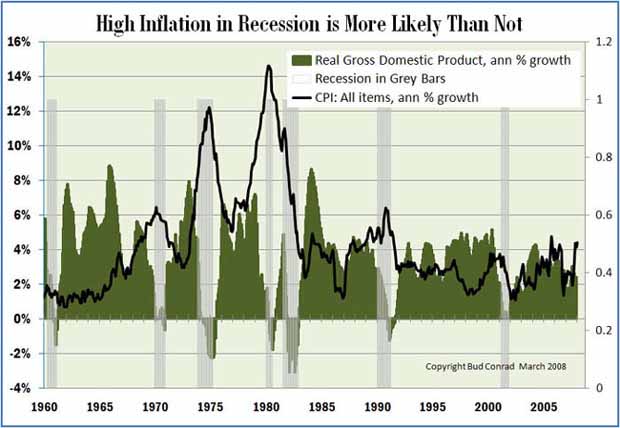 Casey Files Casey Files
Recession, GDP and Inflation:
Conventional Wisdom or Data
Bud Conrad,
Casey
Research
Mar 12, 2008
That we are moving into
- or already are in - a recession is practically a given. But
what will it be: inflationary or deflationary? Casey Research's
Chief Economist Bud Conrad weighs in with his findings...
The debate is coming to a head
over whether we will see inflation or deflation. Will the coming
recession bring deflation from the housing-related credit crisis
in which many forms of debt are disappearing in default; or will
the lack of confidence in the dollar and the government stimulus
bring us inflation?
The consensus of economic opinion
is that the recession that is just starting could lower demand
and thus bring a lowering of prices. "It's just like Japan!
Credit collapse is like the Depression! Those were deflationary!"
say many respected practitioners of the dismal science.
Some deflation! Crude over
$100; wheat hitting $25 a bushel; gold at $970. What is going
on? Yes, housing is dropping 7% in price, and the stock market
is back and forth going nowhere. So which is it? Inflation or
deflation?
I always say "Let's look
at the data." I have been looking at previous recessions
to see what happened to gold and gold shares in the last two
issues of BIG GOLD. Here I just look at the Real Gross Domestic
Product, which is the biggest measure of how well our economy
is producing wealth, to compare to the inflation level. I use
the most quoted government inflation number, the Consumer Price
Index (CPI).

During periods of recession,
the GDP was falling - no surprise there, as that is sort of the
definition of recession. But look at the inflation. It wasn't
falling during recession, it was higher. In two of the seven
recessions someone might argue whether or not it was higher,
but it wasn't noticeably lower. It is amazing how convincing
a look at history can be.
We have been describing the
"Rock and a Hard Place" problem for the Fed, in that
if they lower interest rates, the dollar collapses and eventually
inflation appears; or if they defend the dollar with higher rates,
then the economy collapses. This analysis shows just how serious
the bind is. Historically, when inflation jumped, mostly spurred
by the big oil shocks, we saw both big recessions as well. At
the time, it was acknowledged that the commodity shock caused
the recessions by driving inflation and interest rates higher.
 So the stagflation is really not so
new or rare an occurrence. I have been predicting this for a
long time. We are now there. Bernanke's performance has been
lackluster and not inspiring confidence, to say the least. He
might as well have said "Let the dollar be dammed, full
speed ahead with the helicopters." Instead of a determined,
cigar-smoking disciplinarian like Volcker, he just looks weak. So the stagflation is really not so
new or rare an occurrence. I have been predicting this for a
long time. We are now there. Bernanke's performance has been
lackluster and not inspiring confidence, to say the least. He
might as well have said "Let the dollar be dammed, full
speed ahead with the helicopters." Instead of a determined,
cigar-smoking disciplinarian like Volcker, he just looks weak.
To some extent history has
already predicted the result, so it is really beyond one man's
attempt to push a lever behind the curtain. Really, there's not
that much for him to do but watch the dollar collapse and the
U.S. economy to slow. Stagflation.
Bud Conrad is Casey Research's
chief economist and a regular contributor to BIG
GOLD, a monthly advisory for the more conservative resource
investor. BIG GOLD focuses on large-cap gold producers and near-producers,
gold mutual funds, ETFs and much more.
With gold now up over $970
an ounce, the investing masses will soon catch up to its timeless
value as an inflationary hedge. When that happens, BIG
GOLD subscribers will already be well positioned to benefit
from the incoming tide. Sign up for a risk-free trial subscription
with 100% money-back guarantee today and take a full 3 months
to decide whether BIG GOLD is for you click here to learn more.
###
Doug Casey

Casey Archives
321gold Ltd

|